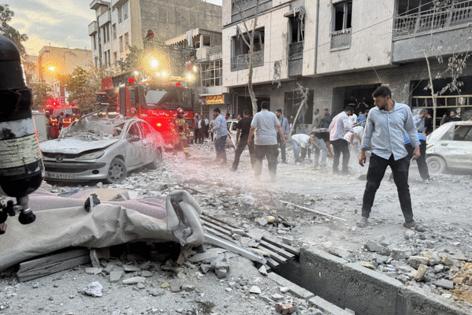Israel launches withering attack on Iran, spurring retaliation and fears of all-out war
Published in News & Features
AMMAN, Jordan — Israel launched a punishing air campaign on Iran early Friday, killing some of the upper echelons of Iran's military leadership along with parts of its nuclear infrastructure. The strikes prompted swift retaliation with what Israel's military said was an attack involving more than 100 drones, even as Iran vowed it was the first wave of its response.
Explosions began to rock Tehran shortly after 3 AM, with blasts reported in the Iranian capital's central, northeastern and northwestern neighborhoods. It was one part of a barrage the Israeli military said had roughly 200 warplanes hitting more than 100 nuclear sites, ballistic missile factories and other military areas across the country, including in Natanz, Kermanshah and Tabriz.
Friday's attacks comprised a significant escalation between the two long-time adversaries — raising fears of a full-on regional conflict likely to embroil the U.S. in another Middle Eastern war.
"This operation will continue for as many days as it takes to remove this threat," said Israeli Prime Minister Benjamin Netanyahu in a video statement released early Friday.
"This is a clear and present danger to Israel's very survival."
The Israeli strikes proved to be a devastating blow to Iran's top military leadership. Iranian state and local media confirmed the death of Maj. Gen. Mohammad Bagheri, the Iranian armed forces' chief of staff; Maj. Gen. Hossein Salami, commander of the Islamic Revolutionary Guard Corps; and Maj. Gen. Gholam Ali Rashid, an IRGC commander that heads the army's central headquarters. Also killed were veteran nuclear scientists Fereydoon Abbasi, Abdolhamid Minoucher and Mohammad-Mehdi Tehranchi, according to the semi-official Iranian outlet Press TV.
Iranian state media said the attacks on residential areas in Tehran killed a number of civilians, including children. The death toll remained unclear but one resident said her relatives were killed.
Iranian Supreme Leader Ayatollah Ali Khamenei said the Israeli attacks extended Israel's "filthy and bloodstained hand to commit a crime in our beloved country."
"With this crime, the Zionist regime has prepared a bitter and painful fate for itself — and it will undoubtedly face it," he said, according to a statement released to local media.
Videos published on social media depicted fire and visible damage to several residential buildings in Tehran — presumably the homes of officials in the Israeli strikes.
Ali, a resident living a few blocks away from one of the targeted sites who gave only his first name to avoid harassment, was praying when he heard huge explosions around him.
"The floor started shaking, so I stopped praying and ran outside," he said. He ran down the street and found smoke coming out of the second floor of a six-story building, with people shouting on the street.
News of the Israeli attack and Iran's retaliation prompted a wave of airspace closures and flight cancellations across the region. Iran, Iraq, Jordan and Israel suspended all flights, while Emirates Airlines said it would cancel flights to Iran, Iraq, Jordan and Lebanon.
As the Iranian drones winged their way to Israel, Jordan warned citizens to keep indoors and avoid open areas. Later, sirens sounded in the Jordanian capital Amman.
U.S. Secretary of State Marco Rubio sought to distance the U.S. from Israel's attacks, describing them "as a unilateral action" that Israal believed was "necessary for its self-defense."
"We are not involved in strikes against Iran and our top priority is protecting American forces in the region," Rubio said according to a statement released by the White House.
"President Trump and the Administration have taken all necessary steps to protect our forces and remain in close contact with our regional partners. Let me be clear: Iran should not target U.S. interests or personnel."
U.S. embassies across the region issued restrictions on movements; in recent days, several embassies evacuated non-essential staff.
Hours before the strikes, President Donald Trump said he did not want Israel to attack so as not to impact negotiations.
"I don't want them going in because, I mean, that would blow it," he said. It was unclear if negotiations would continue.
Israel's operation spurred a raft of condemnations from regional countries. Saudi Arabia's foreign ministry denounced the "heinous Israeli attacks against the brotherly Islamic Republic of Iran."
Oman, the main mediator between the U.S. and Iran in recent months, said the attacks were "unacceptable and ongoing aggressive behaviour that undermines the foundations of stability in the region," according to a statement by the country's foreign ministry.
In a statement, U.N. Secretary-General Antonio Guterres called for "maximum restraint" to avoid "descent into deeper conflict."
©2025 Los Angeles Times. Visit at latimes.com. Distributed by Tribune Content Agency, LLC.







Comments